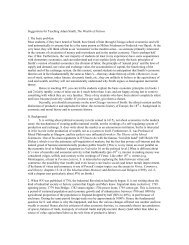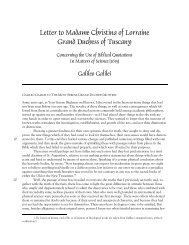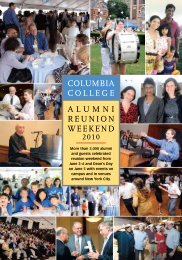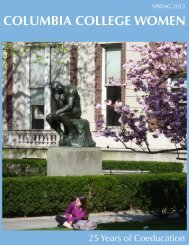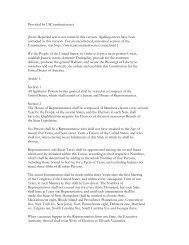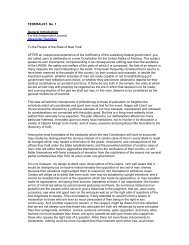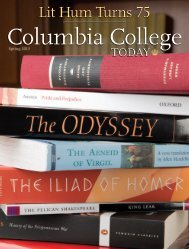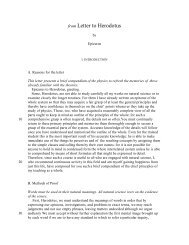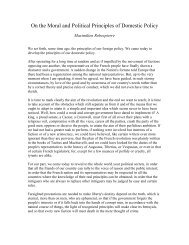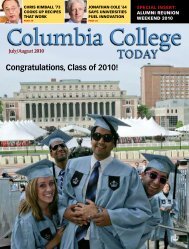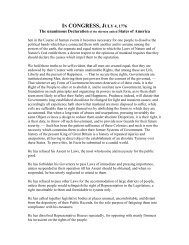Download this issue as a PDF - Columbia College - Columbia ...
Download this issue as a PDF - Columbia College - Columbia ...
Download this issue as a PDF - Columbia College - Columbia ...
You also want an ePaper? Increase the reach of your titles
YUMPU automatically turns print PDFs into web optimized ePapers that Google loves.
AROUND MICHAEL ANDREW THE DELBANCO GERRARD QUADS ’72 ASKS, WHAT IS COLLEGE FOR?<br />
COLUMBIA COLLEGE TODAY<br />
Obama wants to accelerate the growth. But only a small fraction<br />
will attend college in anything like the traditional sense of the<br />
word.Whatever the context, the question remains:<br />
what’s the point? My colleague Mark Lilla<br />
put the matter well not long ago when he<br />
spoke to the freshmen of <strong>Columbia</strong> <strong>College</strong><br />
near the end of their first college year.<br />
He w<strong>as</strong> talking, of course, to students in a<br />
college commonly described <strong>as</strong> “elite.” Divided roughly equally<br />
between young men and women, these students were more racially<br />
diverse than would have been the c<strong>as</strong>e even a few years<br />
ago. About one in ten w<strong>as</strong> born abroad or h<strong>as</strong> some other claim,<br />
such <strong>as</strong> a parent with a foreign p<strong>as</strong>sport, to be an “international”<br />
student; and, though it’s hard to tell the financial means of the<br />
students from their universal uniform of tee shirts and jeans,<br />
roughly one in seven (a somewhat higher rate than at other Ivy<br />
League colleges) is eligible for a Pell grant, a form of federal financial<br />
aid that goes to children of low-income families.<br />
As they filed into the lecture room, they gave each other the<br />
public hugs that signify new friendships, or, in some c<strong>as</strong>es, the<br />
mutually averted eyes that tell of recent breakups. They seemed<br />
simultaneously fatigued and at e<strong>as</strong>e. Once they had settled into<br />
their seats, out came the iPhones and laptops, some of which<br />
stayed aglow for the whole hour, though mostly they listened,<br />
No college teacher should presume to answer <strong>this</strong> question<br />
on behalf of the students, though, too often, he or she will try.<br />
(Requiring discipleship h<strong>as</strong> always been a hazard of the teaching<br />
profession.) Instead, the job of the teacher and, collectively, of the<br />
college, is to help students in the arduous work of answering it<br />
for themselves.<br />
To be sure, students at a college like mine have many advantages.<br />
Elite institutions confer on their students enormous benefits<br />
in the competition for positions of leadership in business,<br />
government, and higher education itself. As soon <strong>as</strong> they are admitted,<br />
even those without the prior advantage of money have<br />
already gotten a boost toward getting what they want — though<br />
not necessarily toward figuring out what’s worth wanting. In<br />
fact, for some, the difficulty of that question rises in proportion to<br />
the number of choices they have. Many college students are away<br />
from their parents for the first time, although in our age of Facebook<br />
and Skype and Google Chat and the like, they are never really<br />
away. Their choices may seem limitless, but powerful forces<br />
constrain them, including what their parents want them to want.<br />
Students under financial pressure face special problems, but students<br />
from privileged families have problems too.<br />
<strong>College</strong> is supposed to be a time when such differences recede<br />
if not vanish. The notion of shared self-discovery for all<br />
students is, of course, a staple of exhortations to freshmen just<br />
coming in and valedictions to seniors about to go out — an idea<br />
invoked so often that it, too, h<strong>as</strong> become a cliché. In other cultures,<br />
however, it would be an oddity. The American college<br />
h<strong>as</strong> always differed fundamentally from the European university,<br />
where students are expected to know what they want<br />
(and what they are capable of) before they arrive. That is true<br />
even at the ancient English colleges of Oxford and Cambridge,<br />
to which students apply around age seventeen to “read” <strong>this</strong><br />
or that subject, and once arrived, rarely venture outside their<br />
chosen field of formal study. By contr<strong>as</strong>t, in America — in part<br />
because of our prosperity, which still exceeds that of most of<br />
the rest of the world — we try to extend the time for second<br />
chances and to defer the day when determinative choices must<br />
be made. In 1850, when Herman Melville, whose formal schooling<br />
ended at age seventeen, wrote that “a whaleship w<strong>as</strong> my<br />
Yale <strong>College</strong> and my Harvard,” he used the word “college” <strong>as</strong><br />
the name of the place where (to use our modern formulation)<br />
he “found himself.”<br />
The American college h<strong>as</strong> always differed<br />
fundamentally from the European university.<br />
rapt. And when Lilla made the following surmise about how<br />
and why they had come to college, they reacted with the kind<br />
of quiet laughter that meant they knew he w<strong>as</strong> telling the truth:<br />
You figured, correctly, that to be admitted you had to exude<br />
confidence about what Americans, and only Americans,<br />
call their “life goals”; and you had to demonstrate that you<br />
have a precise plan for achieving them. It w<strong>as</strong> all bullshit;<br />
you know that, and I know that. The real re<strong>as</strong>on you were<br />
excited about college w<strong>as</strong> because you had questions,<br />
buckets of questions, not life plans and PowerPoint presentations.<br />
My students have convinced me that they are far<br />
less interested in getting what they want than in figuring<br />
out just what it is that’s worth wanting.<br />
A few years ago, I came across a manuscript diary — also, <strong>as</strong><br />
it happens, from 1850 — kept by a student at a small Methodist<br />
college, Emory and Henry, in southwest Virginia. One spring<br />
evening, after attending a sermon by the college president that<br />
left him troubled and apprehensive, he made the following entry<br />
in his journal: “Oh that the Lord would show me how to think<br />
and how to choose.” That sentence, poised somewhere between<br />
a wish and a plea, sounds archaic today. For many if not most<br />
students, God is no longer the object of the plea; or if he is, they<br />
probably do not attend a college where everyone worships the<br />
This 1902 poster<br />
w<strong>as</strong> drawn by John<br />
E. Sheridan, who<br />
created covers for<br />
The Saturday<br />
Evening Post and<br />
other magazines,<br />
and produced by<br />
Deutz Lithograph<br />
Co. in New York.<br />
same god in the same way. Many American<br />
colleges began <strong>as</strong> denominational institutions;<br />
but today religion is so much<br />
a matter of private conscience, and the<br />
number of punishable infractions so small<br />
(even rules against the academic sin of<br />
plagiarism are only loosely enforced), that<br />
few college presidents would presume to<br />
intervene in the private lives of students<br />
for purposes of doctrinal or moral correction.<br />
The era of spiritual authority belonging to college is long<br />
gone. And yet I have never encountered a better formulation —<br />
“show me how to think and how to choose” — of what a college<br />
should strive to be: an aid to reflection, a place and process<br />
whereby young people take stock of their talents and p<strong>as</strong>sions<br />
and begin to sort out their lives in a way that is true to themselves<br />
and responsible to others.<br />
Excerpted from COLLEGE by Andrew Delbanco. Copyright © 2012 by<br />
Princeton University Press. Reprinted by permission.<br />
FALL 2012<br />
46



